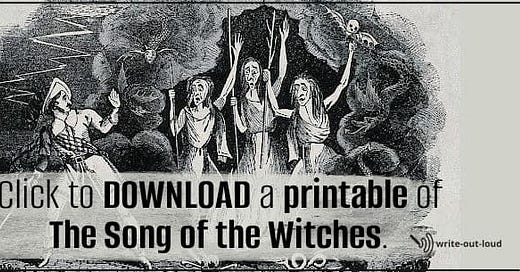Double, Double, Toil and Trouble
Choral speaking to explore, develop and refine presentation skills
OOOOOOOooooh! The ghosts are whispering in the corner by the stairs. Listen. Out in the deep, dark woods the owls are hooting, and a bat screeches.
Yes, it’s Halloween on October 31st - a night steeped in history that is a curious amalgam of ancient Celtic rituals to mark the end of the harvest season and the beginning of winter, two Roman festivals Feralia, (honoring the souls and spirits of the dead), and Pomona, (celebrating the goddess of fruit and trees), with a Christian celebration honoring Saints: All Saints’ Day or All Hallows’ Day.
All of which brings me to one of the most famous and blackest of invocations: the song of the witches, ‘Double, Double, Toil and Trouble’ from Shakespeare’s play Macbeth.
This is a perfect piece for Halloween and absolutely perfect for one of my favorite activities: choral speaking. The fiendishly ghastly ingredients of the broth the witches are brewing up, the mesmerizing rhythms and repeating chorus lines make it utterly compelling.
Having students work together in groups to present a piece like this is a wonderful opportunity for them to consider, and experiment with, all aspects of delivery. The skills learned are invaluable and transferable.
Beginning with:
How are they going to interpret the piece? What is it about? Can they put the story of it into their own words? How does it make them feel?
Then, going on to:
Are they going to say the lines together, like a chorus? Or will they split them between pairs? Or perhaps one person will take a line, then the next will take one, and so on, until the poem is done?
How will they say the lines? Fast? Slow? With menace? Loudly? Softly? Will they overlap them slightly for dramatic effect? Which words will they emphasize?
What will they do about pausing? For how long? When?
Are they going to include movement? Will it be choreographed to heighten the drama? Which person in the group will oversee that?
Will there be sound effects (SFX) underpinning the words as they are spoken? What sort? Ghost noises? Footsteps? A musical instrument? Perhaps a drum. Or a flute. Maybe a violin?
When will they occur? How loud will they be? Who will make them and how?Will the performers wear costumes? Are they going to use props of any sort? A broomstick? A cauldron?
Choral work offers ‘safety in numbers’ - a haven for students who may not be bold enough to explore and experiment in a solo presentation. With the support and energy of a group behind them, you’ll see them beginning to step up and out.
With practice, a choral presentation can be an exhilarating experience for everyone.
A printable of the witches’ song is below.
For more poems to play with in groups try these: 6 classic children’s poems. They’re fun. Click the link for the poems, presentation ideas, a recording of each of them and, a printable.
That’s it for this week.
Happy teaching, happy speaking,
Susan
PS. As I said last week, and I’ll say next, if you have ideas for topics you’d like to see covered in this newsletter, or if you’d like to share an article on some aspect of public speaking, or a speech of your own, please get in touch. Either reply to this email or contact me through the form on my about me page on my website. I’d love to hear from you!
PPS. For more Halloween themed poems for group, and solo, work see: 30 Spooktacular Halloween Poems for Kids of All Ages




Loved this choice for Halloween. And the historical connotations.
Here in Arizona, with our Hispanic influences, Nov. 1 is also Dia de Los Muertes or Day of the Dead. Honoring/remembering those who have passed. Doesn't exactly sound scary, but people do celebrate with scary costumes.
But in Tucson Arizona it's changed a bit, to "All Souls Procession" which is inspired by Dia de Los Muertes. There's a 2-mile long procession, which ends in the ceremonial "Burning of the Urn" - That could be similar to a witches cauldron?? The urn contains offerings, memories & related hopes from those who contribute. Reminds me of that cauldron brew, since there's no telling what people have placed in that urn!
Some lines from Shakespeare could be applicable - maybe?
Your article was terrific, and timely.